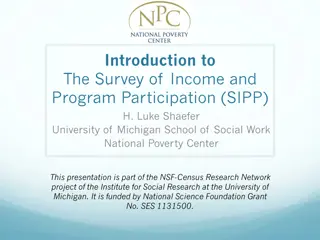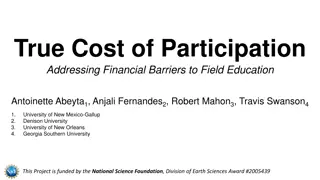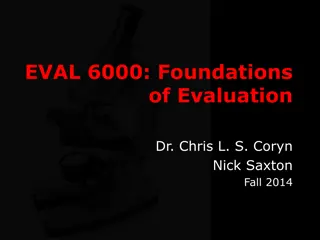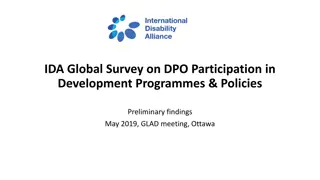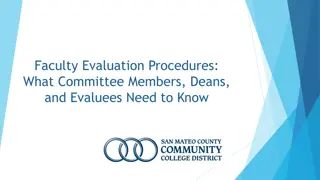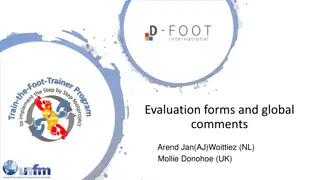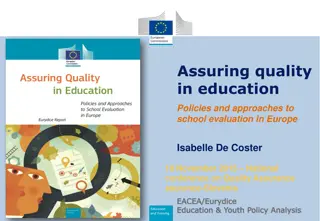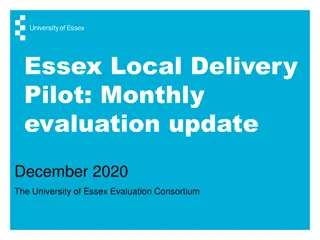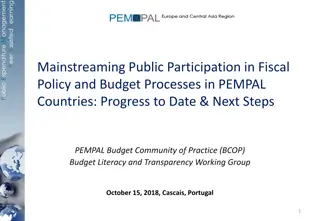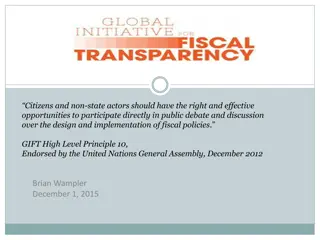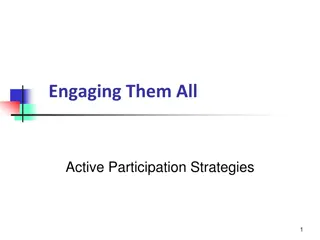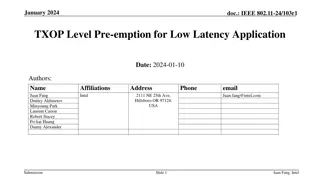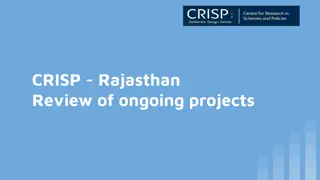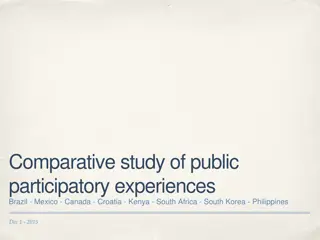Actions Emanating from the Evaluation of the Governance Reform
The evaluation of the governance reform within the WMO aimed to assess its alignment with strategic objectives, effectiveness in responding to societal needs, coordination efficiency, decision-making process, agility, and more. Evaluation criteria included relevance, design validity, effectiveness,
1 views • 13 slides
Comprehensive School Quality Assurance and Evaluation Process
A detailed insight into the Quality Assurance Department's role in school evaluation and improvement processes, including Whole School Evaluation (WSE), Follow-through initiatives, Teaching and Learning assessments, Resumption and Examination Monitoring. The process involves both internal self-evalu
0 views • 20 slides
Methods of Training Evaluation: Overview and Importance
Training and development are fast-growing fields globally, including in India. Evaluation plays a crucial role in understanding the effectiveness and efficiency of training programs for human resource development. This presentation covers the concept of training, evaluation strategies, methods/model
0 views • 61 slides
Universal Evaluation Framework: Simplifying Evaluation Processes
This session introduces the Universal Evaluation Framework (UEF) developed for evaluating QAA Scotland Enhancement Themes. Participants learn key evaluation questions, evidence capture, and the Theory of Change to enhance evaluation confidence. The QAA Scotland Evaluation Odyssey details historical
2 views • 14 slides
Implementing Blind Evaluation Pilot in HORIZON EUROPE: Key Facts and Process
HORIZON EUROPE is conducting a pilot on Blind Evaluation in the 2023-2024 work program to address biases in the research and innovation evaluation process. The pilot aims to assess the feasibility of blind evaluations in ensuring fairness and mitigating potential biases towards well-known organizati
9 views • 9 slides
Strengthening National Evaluation Capacity in the Era of Sustainable Development Goals
The presentation by Vijayalakshmi Vadivelu at the National Evaluation Capacities Conference 2017 in Istanbul focused on the importance of strengthening national evaluation capacity in alignment with the Sustainable Development Goals (SDGs). The content covers the holistic approach to national evalua
3 views • 18 slides
Exploring Developmental Evaluation for Better Decision-Making
Delve into the realm of developmental evaluation, focusing on its purpose, principles, and application in practice. Understand how developmental evaluation emphasizes real-time data collection for informed decision-making in complex systems. Learn about key principles such as developmental purpose,
0 views • 25 slides
Evaluation Practices in Macedonia: What Works, What Doesn't
The comparison between the effectiveness of evaluation practices and the presence of formal institutions in Macedonia raises questions about the impact of institutional design on outcomes. While some countries with robust evaluation institutions fall short in practice, others lacking such structures
1 views • 7 slides
Enhancing Evaluation Capabilities in Mongolia for Agenda 2030
The Mongolian Evaluation Network in collaboration with UNDP is working to integrate the 2030 Agenda into national strategies and plans, establish institutional coordination mechanisms, align budgets, and enhance data monitoring systems. Key stakeholders including government agencies, NGOs, and inter
0 views • 9 slides
Understanding Demi-Regularity in Realist Evaluation
Realist Evaluation is a theory-driven approach focusing on understanding the context and mechanisms of action behind policies and interventions. This webinar explores the concept of demi-regularity in realist evaluation, its origins, and its application in analyzing complex evidence. Key aspects cov
1 views • 16 slides
Introduction to the Survey of Income and Program Participation (SIPP)
The Survey of Income and Program Participation (SIPP) is a nationally representative, longitudinal survey providing data on income dynamics, government program participation, and social contexts of U.S. households. The SIPP aims to evaluate annual and sub-annual changes in income, program participat
0 views • 27 slides
Understanding Evaluation in Education
Evaluation in education is a comprehensive term that encompasses measurement, testing, and qualitative examination of student behavior. It involves both quantitative and qualitative descriptions, along with value judgments. Differentiating from mere measurement, evaluation provides a deeper analysis
0 views • 28 slides
Sustainable Evaluation Systems Workshop Summary
Workshop on Sustainable Evaluation Systems by Stephen Porter at the NEC Conference focused on defining evaluation systems, addressing their failures, and emphasizing the importance of quality, use, and networks in achieving sustainability. Participants engaged in activities such as bingo card introd
0 views • 38 slides
Strategic Management: Strategy Review and Evaluation
This chapter delves into the critical process of strategy review, evaluation, and control in strategic management. It covers the nature of strategy evaluation, effective evaluation systems, contingency planning, auditing, using computers for evaluation, and guidelines for effective strategic managem
1 views • 42 slides
Understanding Evaluation and Ideology in Translation
Evaluation plays a crucial role in the study of translation, influencing both meaning and value in communication. This evaluation is reflected through language elements like accentuation, deletion, and substitution. Appraisal, stance, and evaluation are key terms in linguistic analysis that focus on
2 views • 22 slides
Impact and Evaluation Toolkit for Churches and Christian Charities
This toolkit aims to equip churches and Christian charities engaged in small-scale social action projects to think about impact, measure impact, choose data tools, reflect on evaluation data, and use it effectively. It covers principles of evaluation, setting objectives, selecting indicators, storyt
0 views • 34 slides
Evaluation Metrics for IEEE 802.11-14/0107 HEW Proposal
Evaluation metrics play a crucial role in assessing WLAN system performance and achieving the objectives of High Efficiency WLAN (HEW). This proposal by Yonggang Fang et al. from ZTE outlines the key evaluation metrics recommended for evaluating HEW performance, including area throughput, average th
0 views • 12 slides
Overview of Monitoring and Evaluation in the GEF
The Evaluation in the GEF and Training Module focuses on promoting accountability and learning within the Global Environment Facility (GEF) through monitoring and evaluation activities. The GEF Independent Evaluation Office plays a crucial role in assessing results, effectiveness, and performance of
0 views • 25 slides
Chile Country Portfolio Evaluation 2010-2014 Summary
Evaluation process of Chile's country portfolio from 2010-2014 included pre-evaluation, during evaluation, and results/conclusions phases. Challenges like defining scope and participant concerns were addressed. Preliminary conclusions were presented to stakeholders, leading to a trustful and represe
1 views • 6 slides
Addressing Financial Barriers to Field Education: True Cost of Participation
Exploring the financial barriers hindering participation in field education, this project delves into the costs associated with field work trips and the impact on student involvement. Lack of adequate gear, safety hazards, and quality of trips are highlighted as potential barriers. The study aims to
0 views • 15 slides
Potential Amendments for Reforming REACH Evaluation Process
Discussion at the Ad-hoc Meeting of Competent Authorities for REACH and CLP focused on potential options for amending the REACH Regulation to reform the evaluation process. Topics included registration-related measures, substance evaluation, testing proposals, compliance checks, and expectations dur
0 views • 30 slides
Developing an Evaluation Work Plan for Effective Program Assessment
This presentation by Amy D. Andrade from San Jose State University focuses on developing an Evaluation Work Plan to identify responsibilities and timelines. It covers topics such as Evaluation Coaching Support, Webinar Outlines, Logic Model, Inputs-Outputs-Outcomes, Two Approaches to Evaluation, Pro
0 views • 29 slides
Foundations of Evaluation - Conference Experience and Approaches
The Foundations of Evaluation course covers diverse topics such as improvement- and accountability-oriented evaluation approaches, social agenda evaluation, and eclectic approaches. The course material includes insights on decision- and accountability-oriented studies, methods for program improvemen
0 views • 29 slides
Global Survey on DPO Participation in Development Programmes & Policies
The IDA Global Survey gathers preliminary findings on the participation of persons with disabilities in development programs and policies, emphasizing the importance of meaningful engagement and representation through DPOs. The survey aims to monitor the reality of DPO involvement, consultation, and
0 views • 13 slides
Evaluation Synthesis in Changing Contexts: Enhancing Knowledge for Development Effectiveness
Evaluation synthesis is crucial for promoting learning, reflection, and decision-making in development work. This process involves bringing together diverse knowledge sources to generate strategic insights and facilitate wider use of evaluation findings. The Independent Office of Evaluation of IFAD
0 views • 20 slides
NICD Procedure for RT-41 Tender Requirements and Evaluation of HIV Rapid Test Kits
The NICD provides detailed tender requirements for professional kits and self-test kits to meet technical specifications. Suppliers must adhere to pre-screen suitability criteria, provide evidence of independent evaluation by recognized agencies, possess necessary certifications, submit regulatory v
0 views • 14 slides
Evaluation of FME Zero Emission Neighbourhoods in Smart Cities
The mid-term evaluation process of FME Zero Emission Neighbourhoods in Smart Cities involves self-evaluation, partner evaluation, and panel evaluation. The procedure includes scientific review, evaluation by scholars, and innovation assessment. Key documents like self-reports, progress reports, and
1 views • 20 slides
Overview of Regular Evaluation 2017 Findings in Estonia
In the Regular Evaluation 2017, efforts were made to maximize the benefits of evaluation outcomes for various stakeholders in Estonia such as the state, society, and institutions. The evaluation focused on a range of actions including preparing legislation, finding experts, creating self-report form
0 views • 6 slides
Faculty Evaluation Procedures: Committee Structures and Purpose Overview
This slide deck provides information on faculty evaluation procedures, emphasizing the purpose of the evaluation process in supporting faculty development, ensuring student access to quality education, and upholding academic freedom. It also details the committee structures for comprehensive tenured
0 views • 19 slides
Evaluation Forms and Global Comments by Arend Jan (AJ) Woittiez (NL) and Mollie Donohoe (UK)
The evaluation process for a course divided into lectures and workshops involved daily distribution of evaluation forms to collect feedback and free-text comments. Participants rated lectures and workshops on relevance, clarity, preparation, objectives, participation, and interaction. Overall, posit
0 views • 13 slides
Comprehensive Guide to Training Evaluation Methods
This detailed guide covers the aim of evaluation, evaluation methods, techniques of evaluation, types of evaluation (formative, process, outcome, impact), and the significance of formative and process evaluation in assessing training effectiveness. Learn about the key principles and practices involv
0 views • 45 slides
Ensuring Quality in Education: School Evaluation in Europe
Explore the policies and approaches to school evaluation in Europe with a focus on external and internal evaluation methods, quality assurance approaches, and recommendations from the European Parliament and Council. Discover insights on the purpose and evolution of school evaluation, emphasizing th
0 views • 23 slides
December 2020 Essex Local Delivery Pilot Monthly Evaluation Update
The December 2020 update of the Essex Local Delivery Pilot's monthly evaluation includes actions from the previous month, process evaluation details, population information, test and learn strategies, learning and development insights, recommendations, and further information. Key evaluation activit
0 views • 30 slides
Enhancing Public Participation in Fiscal Policy and Budget Processes in PEMPAL Countries
This document discusses the progress and next steps in mainstreaming public participation in fiscal policy and budget processes in PEMPAL countries. It covers definitions of public participation and budget literacy, outlines international frameworks, presents survey findings on public participation,
0 views • 35 slides
Employee Participation Trends and Challenges in the UK
This presentation delves into the significance of employee participation and involvement (EPI) in the UK, discussing its operation, trends, challenges in precarious labor markets and the gig economy. It highlights the benefits of involving employees in decision-making processes, such as protecting w
0 views • 23 slides
Enhancing Public Participation in Fiscal Policy Design and Implementation
Public participation in fiscal policy processes is essential for improving resource allocation, targeting policies to meet citizens' needs, empowering citizens, broadening dialogue, reducing corruption, enhancing service delivery, reforming state agencies, and increasing government legitimacy. This
0 views • 17 slides
Enhancing Active Participation Strategies for Student Engagement
Engaging Them All Active Participation Strategies by Anita L. Archer, Ph.D., focuses on the importance of eliciting frequent responses from students to create a positive learning environment, increase engagement and accountability, and promote desired behaviors. The resource emphasizes the benefits
0 views • 72 slides
Enhancing Low Latency Applications with Pre-emption in IEEE 802.11-24/103r1
Discussion on pre-emption as a solution for low latency applications in UL SU TXOP scenarios. Techniques for dividing large PPDU into smaller ones, allowing pre-emption opportunities, and enabling LL PPDU transmission after pre-emption are explored. Strategies for AP to initiate LL packet transmissi
0 views • 8 slides
Comprehensive Evaluation of IRGY-Urban Scheme in Rajasthan
CRISP is conducting a detailed evaluation of the Indira Gandhi Shahari Rozgar Guarantee Yojana (IRGY) in Rajasthan, focusing on ongoing projects, concurrent assessment, impact evaluation, and enhancing worker participation. The evaluation includes findings, best practices, and recommendations to imp
0 views • 23 slides
Comparative Study of Public Participatory Experiences in Various Countries
This study compares public participatory experiences in Brazil, Mexico, Canada, Croatia, Kenya, South Africa, South Korea, and the Philippines, evaluating how each case defines public participation, distinguishes between access to budget information and participation processes, and categorizes insti
0 views • 13 slides










